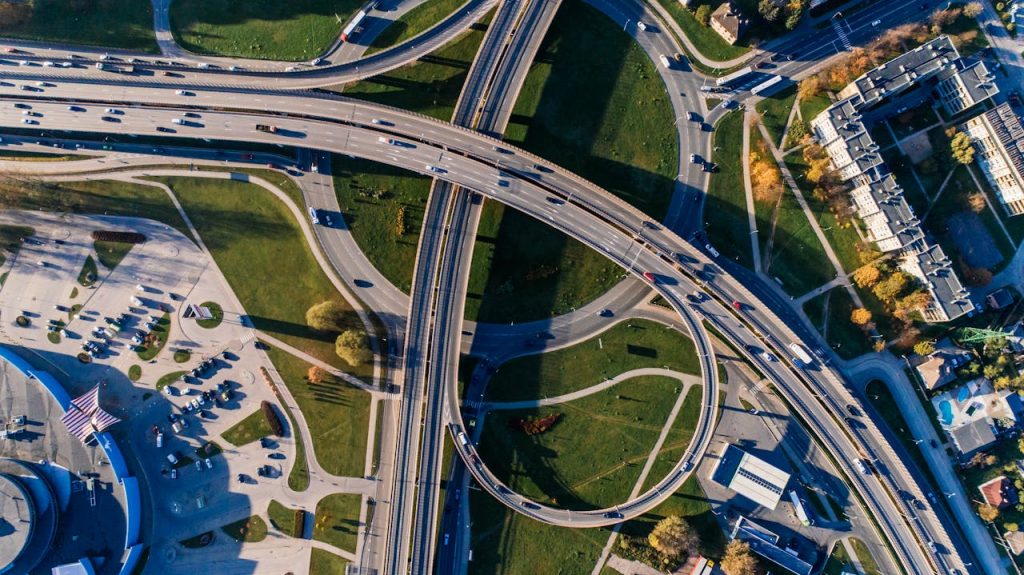- Modern road construction prioritizes sustainability through recycled materials, energy-efficient technology, and designs that minimize environmental impact.
- Improved road quality reduces vehicle emissions and noise pollution by enabling smoother, more efficient driving and using quiet pavement technologies.
- Advanced road designs incorporate effective stormwater management features like permeable pavements and bioswales to filter pollutants and support groundwater replenishment.
- The advancement of road construction practices is crucial for economic growth, community connectivity, and the promotion of sustainable urban development.
Cities are vibrant aspects of culture and commerce, constantly weaving the story of human progress. At the heart of every city’s narrative lies its infrastructure, with roads playing a pivotal role in shaping the urban experience. Beyond mere conduits for vehicular transit, well-kept roads are the lifeblood of bustling metropolises and emerging urban hubs. This piece will explore how the seemingly mundane practice of quality roadwork is a linchpin in urban development, touching on every aspect, from economic prosperity to sustainable growth.
How Quality Roadwork Can Be Achieved
Ensuring the quality of roadwork is critical for fostering sustainability and enhancing the quality of urban life, from adopting modern materials and technologies to implementing rigorous project management practices. Collaboration among various engineers guarantees the completion of functional and beneficial roads to the community.
Road construction is also a product of meticulous planning, cutting-edge technology, and skilled tradespeople. The role of a skilled asphalt contractor is particularly useful and multifaceted. From the initial stages of surveying and design to the final touches of laying and sealing, they ensure that the road meets the highest durability and safety standards.
Modern roadworks use hot in-place recycling and pavement management systems to extend road lifespan and cut maintenance costs. Properly mixed and applied asphalt withstands weather and traffic, offering smooth, reliable service for years.
Increased Accessibility and Connectivity
The immediate benefits of quality roadwork are increased accessibility and connectivity. Cities promote a sense of connectedness by providing well-maintained paths for their stakeholders.
Improved Traffic Flow and Reduced Congestion
Effective road planning and execution lead to improved traffic flow and reduced congestion. Wider lanes, smoother surfaces, and strategic signage enhance the movement of vehicles. Traffic signals and roundabouts are also often optimized to keep traffic moving smoothly.
Furthermore, innovative technologies such as intelligent transportation systems (ITS) and real-time traffic updates help manage congestion. When commuters spend less time stuck in traffic, their overall quality of life improves, and they contribute fewer carbon emissions to the atmosphere.
Enhanced Public Transportation Efficiency

Quality roadwork benefits individual drivers and the public transportation that thrives in it. Well-paved roads ensure buses and trolleys can stick to their schedules. They also pave the way for modern transit solutions such as bus rapid transit (BRT) and light rail systems.
Fostering Stronger Community Links
Roads are more than a means to an end; they are the fabric that knits communities together. The construction of new roads and the maintenance of existing ones offer opportunities for urban infill and renewal, connecting once-isolated neighborhoods and encouraging efficient trade for communities.
Economic Benefits
High-quality roads catalyze economic vitality, offering benefits for every sector. This integrative approach pays back to everyone involved in its execution.
Creating Job Opportunities
Major roadwork projects can create many jobs, ranging from surveyors and engineers to construction workers and maintenance crews. These temporary positions help support local families during the construction phase.

Attracting Businesses and Investments
Robust road networks make cities more attractive to corporations looking to establish or expand their operations. This interest, in turn, leads to increased investment in commercial and industrial properties, generating tax revenues for further urban development initiatives.
Stimulating Local Commerce for the People
Quality roadwork also stimulates local commerce by making it easier for consumers to reach shopping districts and business centers. Well-connected roads bring communities closer to essential services like schools, hospitals, and government buildings.
The availability and accessibility of the different infrastructure and opportunities support a thriving local economy. It also fosters a climate conducive to entrepreneurship and small business growth.
Environmental Considerations
Sustainable practices have become integral to the process of urban development. The huge backfire that can happen has been too impactful to ignore.
Sustainable Construction Practices
Modern road construction focuses on sustainability, using recycled materials, energy-efficient technologies, and low-impact designs. By incorporating reclaimed asphalt pavement (RAP) into new mixtures and deploying solar-powered construction equipment, the environmental footprint of road projects is significantly reduced.
Reduced Emissions and Noise Pollution
An often overlooked benefit of quality roadwork is reduced vehicle emissions and noise pollution. Smooth roads facilitate more efficient driving, decreasing fuel consumption and lowering carbon emissions. Additionally, quiet pavement technologies lessen the noise pollution that urban roads can generate.
Improved Stormwater Management
Well-built roads are constructed with careful attention to managing stormwater runoff. Porous pavements and bioswales filter pollutants and replenish groundwater, reducing the strain on urban infrastructure during heavy rainfall.
The impact of well-crafted roads extends far beyond the surface, playing a pivotal role in promoting economic prosperity, enhancing community connectivity, and supporting sustainable urban development. Employing innovative construction techniques and materials can significantly mitigate the negative environmental impacts traditionally associated with road building. Altogether, these advances underscore the importance of prioritizing road infrastructure for more resilient and sustainable cities.









